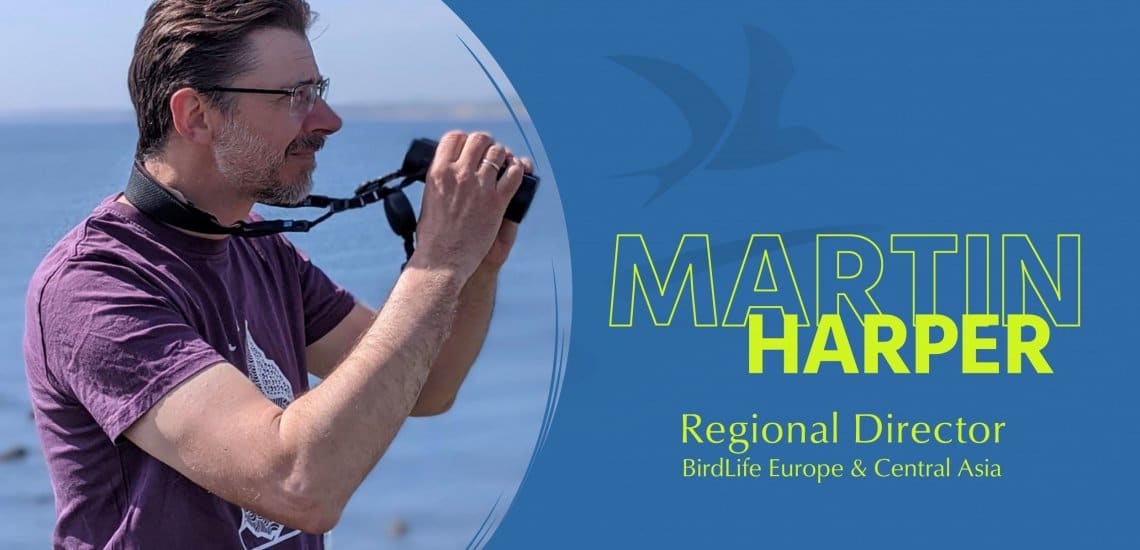Countdown 2030: four lessons from the first month of the UN Decade on Ecosystem Restoration

We are one month on from the launch of the UN Decade on Ecosystem Restoration, with another 119 months to drive the transformational changes to address the climate and ecological emergency – an emergency that had been brought into sharp focus by the heatwaves and fires raging in British Columbia and Siberia.
By Martin Harper, Regional Director, BirdLife Europe & Central Asia
I have spent the past four weeks getting to grips with my new job as BirdLife’s Regional Director for Europe and Central Asia. While I am still working from the same kitchen table that I was when I was at the RSPB, thanks to technology I have been connecting with my new colleagues around the world while also “meeting” many partners from across the region. It has been inspiring to hear what they are achieving (such as a moratorium on hunting turtle doves in Spain, tackling illegal killing of birds in the Mediterranean or restoring the forests and grasslands of the Iori Valley in Georgia) and exciting to explore what we can achieve together over the coming months.
While the world leaders are due to set a new global plan for restoring nature and tackling climate change at UN summits later this year, BirdLife itself is refreshing its thinking about how we have maximum impact for nature. The region that I am now leading will be determining its contribution to the global effort over the next few months.
In this post, I reflect on recent developments and draw out some key messages for BirdLife and other conservation organisations
First, we must continue to fight unsustainable exploitation of the natural world.
The recent victory by French BirdLife Partner LPO is a reminder that while we want and need to invest effort in driving restoration, we still have to fight hard to stop the ongoing exploitation of the natural world – even some practices which should have been outlawed fifty years ago. Last week, the French High Court confirmed that using glue (lime-) sticks to hunt birds should be permanently banned in France. This followed a judgement by the European Court of Justice that confirmed its previous judgement against Spain and Malta that this practice was unlawful under the EU Birds Directive. All those involved in the fight deserve huge credit and it should provide a huge impetus in their attempts to end unsustainable hunting practices. It seems crazy that we still have to invest campaigning effort to secure these wins in the twenty-first century, but fight we must. Just last week it was confirmed that the mass killing of griffon vultures in the Salamanca region of Spain was done with poisoned bait (carbofuran).
Second, we must claim the truth about what the new commitments that politicians are making mean in practice.
The G7 appeared to be saying the right things when they met in Cornwall earlier this month by committed to “protect our planet by supporting a green revolution that creates jobs, cuts emissions and seeks to limit the rise in global temperatures to 1.5 degrees. We commit to net zero no later than 2050, halving our collective emissions over the two decades to 2030, increasing and improving climate finance to 2025; and to conserve or protect at least 30 percent of our land and oceans by 2030.”
We must make it abundantly clear that when politicians commit to “protecting or conserving 30% of land and sea”, then they need to care about the wildlife within these areas and they need to be honest about the scale of effort required this decade.
Currently only circa 11% of EU seas are protected (8% in Natura 2000 sites and 3% under additional national protection) and less than 1% is under strict protection. A study in 2019 found that only 1.8% of the EU marine area is covered by MPAs with a management plan in place, and of these areas covered by management plans, only a small proportion have effective management measures in place to ensure the proper protection. Therefore, the vast majority of MPAs in the EU are not covered by a management plan and can be considered paper parks that offer little real protection.
The situation on land is similar. While at the RSPB, I would point out to politicians that while circa 28% of UK land might be in some form of designated areas and the 30% commitment was welcome, using government’s own figures, just 5% of land in the UK is currently protected and well managed for nature. The 30% target would therefore require a six-fold improvement this decade.
This story is reflected across Europe and parts of Central Asia. Within the EU, protected areas cover 26% of EU land (18% designated as Natura 2000 sites and 8% as other national designations). The coverage in those countries outside of the EU but signatories to Council of Europe’s Bern Convention is 23% (with these sites forming part of the Emerald Network)*. I don’t have figures for the condition of these sites, but we do know that at the EU level, only 15% of habitats are in good condition which suggests that the step change in management is needed within protected areas.
It is obvious that we need a massive step change in protection and management of sites on land and sea to meet the 30 by 30 target. But first, we must ensure politicians interpret the new commitments truthfully before taking the actions needed to deliver the level of protection and management that nature needs.
Third, we need to make the case that the nature and climate emergency needs to be tackled together.
This was the message in the recent report of the first collaboration of the two intergovernmental groups on climate change (IPCC) and biodiversity and ecosystem services (IPBES) through a workshop hosted by the governments of the United Kingdom and of Norway. Reinforcing what many of us have been saying for more than a decade, the report concludes that narrowly-focused actions to combat climate change (especially inappropriately conceived or located tree planting or renewable energy projects) can directly and indirectly harm nature and vice-versa, but many measures exist that can make significant positive contributions in both areas. They highlight five areas were solutions exist to deliver win-wins for both climate and nature:
- Stopping the loss and degradation of carbon- and species-rich ecosystems on land and in the ocean, especially forests, wetlands, peatlands, grasslands, and savannahs
- Restoring carbon- and species-rich ecosystems
- Increasing sustainable agricultural and forestry practices to improve the capacity to adapt to climate change, enhance biodiversity, increase carbon storage, and reduce emissions.
- Enhancing and better-targeting conservation actions, coordinated with and supported by strong climate adaptation and innovation
- Eliminating subsidies that support local and national activities harmful to biodiversity – such as deforestation, over-fertilization and over-fishing
For too long, biodiversity has been seen as an issue of lower importance in the minds of politicians and even some environmental campaigners. I hope that this report marks a turning point that the only way to deal with the emergency is to tackle the issues together.
Fourth, we have to call out those policies that are inconsistent with or undermine political rhetoric on the environment.
Events over the past month have highlighted the tension exists between the political desire to say the right thing and the harsh reality of formulating policy to back it up. In its new report, the UK Government’s independent Committee on Climate Change concluded that the UK will miss climate goals by ‘huge margin’ without new policies. The UK has set a world-leading target for set a new legally-binding target to cut the country’s greenhouse gas emissions 78% by 2035 compared to 1990 levels yet, clearly, its environmental credentials can only be enhanced if matched with the right action.
A similar pattern emerged in the European Union where one week the European Parliament voted in favour of a legally binding target to restore 30% of the EU’s land and sea while a couple of weeks later European politicians agreed a deal of the future of agriculture policy which its own auditor service and over 3600 scientists have condemned. Numerous studies have confirmed that the intensive farming the Common Agriculture Policy (CAP) promotes is pushing many species towards extinction and the proposed changes will do little to reverse that trend.
At times it feels as though governments are driving their environmental agenda with the handbrake on, which is anything other than acting as though we are facing a planetary emergency. Greta Thunberg put it more bluntly last week by telling the Austrian World Summit that,
“Let’s be clear — what you are doing is not about climate action or responding to an emergency. It never was. This is communication tactics disguised as politics.”
This needs to change.
As NGOs and voters, we have a responsibility to ensure that governments set the right ambition, to try to influence policies to back that up but we must also be prepared to call out those policies that are inconsistent with or undermine that ambition.
These then are my four lessons from the past month, to make the UN Decade on Ecosystem Restoration a success, civil society organisations must continue to:
- fight unsustainable exploitation of the natural world
- claim the truth about what the new commitments that politicians are making mean in practice
- make the case that the nature and climate emergency must be tackled together
- call out those policies that are inconsistent with or undermine political rhetoric on the environment.
If you have any thoughts on what I have written, it would be great to hear your views by contacting me at @martinBirdLife.
*Interestingly for Brits like me, at the end of 2020, the UK registered all its Natura 2000 sites as part of the Emerald Network which is a reminder that, despite Brexit, they remain of international importance and are rooted in European law.
More from Martin’s blog
Stay up to date
Sign up to receive the latest bird conservation news. You’ll also receive updates about our projects, science and other ways to get involved including fundraising.
Thank you for your support, we are committed to protecting your personal information and privacy. For more information on how we use your data, please see our Privacy Policy. You can unsubscribe from emails at any time by using the link in the footer of any email from us.



